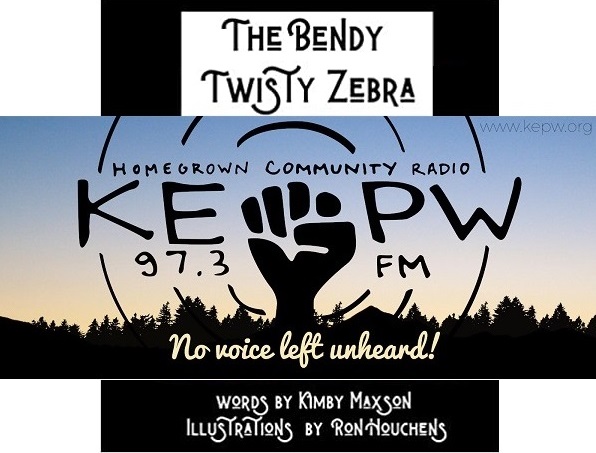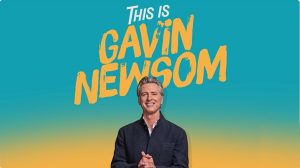Children’s book promotes awareness of Ehlers-Danlos syndrome
6 min read
Simone: Okay, Storytime listeners. Here’s the book from Kimby Maxson and Ron Houchens: The Bendy Twisty Zebra. Today I am up in, right near the studio. In fact, we’re upstairs. It’s been a while since we’ve been up here and we are at the “Knights of the Round” table, I like to call it, and we’re going to have an interview here over here at this magical ‘Growers Upstairs’ above the Grower’s Market.
[00:00:29] Kimby Maxson: Okay. I full on deja vu‘ed because I walked up these stairs a million and a half times. So my oldest daughter—when she was a little tiny nursing baby, I worked at the Comic News up here and I was here all day, every day, with a kid hanging off my boob. I would walk into the other room and get my coffee or my tea and walk down to Monster Cookie and everybody here knew us because my little toddler-crawling-around-baby would just go to all the different offices.
[00:00:55] And I worked at PeaceWorks, also volunteered at PeaceWorks. (Nice.) And that was right across the hall. So, bringing back a lot of memories, being up here, like, core Eugene stuff, you know?
[00:01:04] Ron Houchens: My name is Ron Houchens. I’ve spent the majority of my adult life being an art educator. I’ve worked at Oregon Coast Community College, Oregon Coast Aquarium‘s education department and outreach program, teaching art as well as elementary level for quite a while. I moved here to Eugene a couple years ago with my beautiful wife, Kimby. I own a tattoo shop on Willamette Street, Iron Heart Tattoo. I mainly focus on doing coverups and reworks, originals as well.
[00:01:37] Simone: And Kimby.
[00:01:38] Kimby Maxson: I’ve always wanted to write kids’ books, and many, many, millions of years ago when I was a kid, I won this Oregon Young Writers Association Award for my children’s book that I wrote. (Lovely.) Ron and I started talking. He’s like, ‘Oh, I’ve always wanted to illustrate kids’ books.’ ‘Oh my God, we could write kids books and you could illustrate ’em. I could write ’em.’
[00:01:56] Ron Houchens: Yeah. That was definitely the first time we met.
[00:01:58] Kimby Maxson: And so, The Bendy Twisty Zebra. It was something I had wanted to write for a long time. My daughter Jade, she’s a rock star. She’s amazing. Her whole life, she had physical issues and it took years to diagnose this disorder.
[00:02:13] It’s Ehlers-Danlos. It’s a connective tissue disorder. (Okay.) And there’s 13 different types of Ehlers-Danlos, it’s a big spectrum. Some of them are more isolated. So there’s a vascular EDS. She has hypermobile EDS, which means she could walk off a step and dislocate her knee. She can sneeze and dislocate her rib, which has happened like hundreds of times. (Wow.)
[00:02:35] So she’s just, she’s amazing. She made it through high school in theater and on stage with ribs dislocated, and they kept crutches there at school for her because she just dislocated all the time.
[00:02:46] She’s a rock star. For real. She’s amazing. But it took us years to figure out this disorder and we wrote this book for—This is the book I wish I would’ve had when Jade was little. I wish I would’ve had this book when she was six. I would’ve been like, ‘Oh my God. That’s what she has.’
[00:03:03] Because the zebra—the Bendy Twisty Zebra—named Rose, she has her group of friends and they’re very supportive to her, as Jade’s real-life friends are. And they meet another little zebra who has all the symptoms that are part of Ehlers-Danlos.
[00:03:17] So the reason it’s called Bendy Twisty Zebra is because people with Ehlers-Danlos are extra bendy and twisty, right. But in medicine and in medical school, they teach that, ‘If you hear hoof prints, you know you’re looking for a horse.’ So zebras in medicine are considered people with rare disorders, unusual diagnoses, right.
[00:03:39] So, the Ehlers-Danlos Society, which is a worldwide society that is incredible, I go to their conferences, they do a lot of work in the U.K. (Wow) and they do a lot of outreach and a lot of support for this community, they’ve taken the term Zebra to mean folks with Ehlers-Danlos. (Love it.) So: Bendy, Twisty Zebra.
[00:03:58] Simone: Are you born with it? Or is that something from, like, unhealthy diet or something like that?
[00:04:02] Kimby Maxson: No, it’s a genetic thing, but diet certainly has something to do with it. (Yeah, yeah.) There’s things that can exacerbate it. There’s things that can make it a little bit better. Certainly learning body mechanics is a big deal. And so part of my motivation—in my massage practice, I work with people with it—but part of my motivation in becoming trained to be an advanced practitioner in pelvic floor work is because a lot of women with Ehlers-Danlos end up with some uterine prolapse and pelvic floor dysfunction later in life. And so yeah, I really want to be available for that community.
[00:04:35] Simone: Dude, that’s awesome. I love stories like this.
[00:04:38] Let’s say somebody’s listening right now and they’re like, ‘Oh my gosh.’ Like all of a sudden a light bulb’s on and they’re like, ‘This is something that might be related to something that I’m struggling with,’ or ‘someone I love is struggling with.’ Do you have an outreach number that they could—?
[00:04:54] Kimby Maxson: Absolutely. Absolutely. Yeah. I mean, my email is Kimby Maxson at Yahoo dot com and it’s KimbyMaxson@Yahoo.com. And if a person was just reaching out to me, I can’t diagnose them, I’m a massage therapist, but I know people, I can direct them to places that they can, and, if somebody was to reach out, put in the subject line on an email, ‘I think I have EDS, I’m looking for resources.’
[00:05:20] And that happens all the time. Yeah. And I don’t mind helping people find the path of where they need to go for diagnosis and then afterwards see what happens with them.
[00:05:31] Simone: Wow. ‘Cause I never even heard of it. And you never know. I mean, maybe this show is going to hit the ears of somebody who’s really been looking for some kind of like answer, maybe.
[00:05:39] Ron Houchens: And that’s another thing that our book’s about. It’s about friendship and support—
[00:05:43] Kimby Maxson: —and just really supporting people’s differences. And in the meanwhile, on a side note, the book is about Ehlers-Danlos and might be an amazing tool for a parent whose has these symptoms and the kid maybe won’t feel so (so alone), freakish, so weird.
[00:06:02] Simone: And what a beautiful thing. I mean that, like here at KPEW, too, that’s our little motto, is: ‘No voice left unheard.’ (Oh, I love it.) So we really try to reach out to those people who feel like they don’t fit in somewhere, or, you know, we really advocate for… We’re gonna have to wrap it up, but let’s just again say how beautiful and amazing you are as an individual and you are as an individual, and then that you guys came together and created this beautiful book and you’re just amazing people that contribute to the community in a beautiful way.
Storytime airs every Wednesday at 8 p.m. on KEPW 97.3 LPFM Eugene PeaceWorks, homegrown community radio. For more about Ehlers-Danlos Syndrome, hear more of Storytime (broadcast date Feb. 15, 2023).







